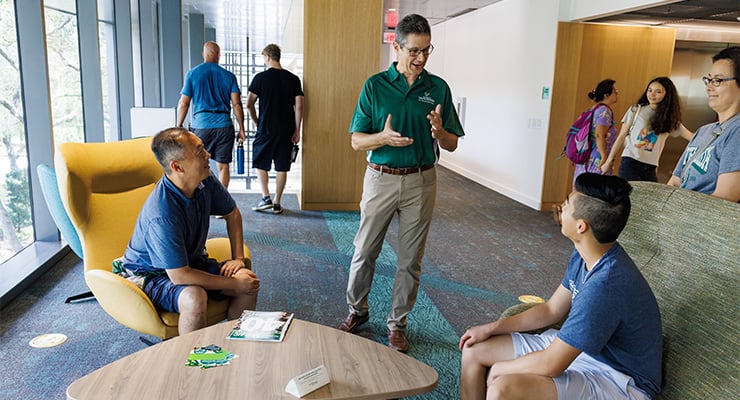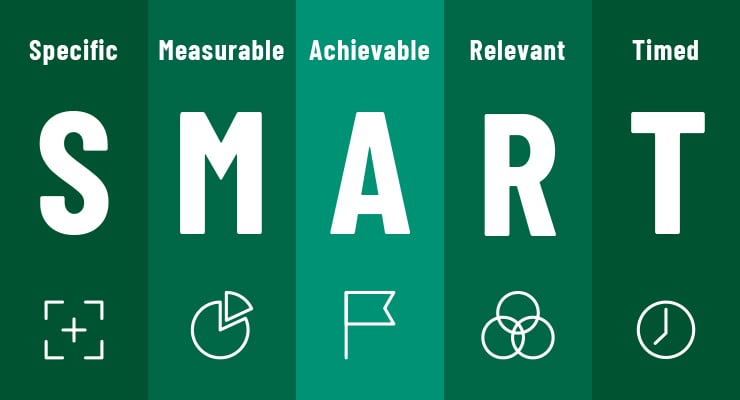Does Your College Choice Affect Your Career?
By Emily Young | Last Updated: Mar 5, 2025

We’ve been where you are, so we get it: the college admissions process is harrowing. In fact, you probably found this post after a panicked Google search: Does your college choice affect your career? What if you don’t get into — or choose — the best school? Should you just give up and binge One Piece again?
We’ve got the answers to your questions:
- Here’s the good news: getting a college degree positively affects your career, but where you go to school is much less important than earning that diploma.
- There’s no such thing as “the best” school, but there might be a school that’s best for you. We’ll show you how to assess your options.
- Yes, you should probably binge One Piece again. But don’t give up on the college process. You’ve got this.
Let’s dive deeper into how your college choice can affect your career — and how to choose the right school for you.
Wait! Does a College Degree Even Matter for Career Success?
At this point, you might be suffering from so much decision fatigue, you wonder if a college degree is necessary at all. You might’ve noticed that many U.S. job postings are no longer requiring a four-year degree. Maybe you’ve talked to peers who say you don’t need more than a high school education to succeed financially — a view that 45 percent of Gen Z holds. The truth is, going to college is making the right choice. Here’s why:
- What companies do is different from what they say. Job listings might suggest you don’t need a degree, but if you look at key data, “employers are hiring more (not less) college grads,” according to a Burning Glass job analysis.
- Job opportunities for those without college degrees are projected to shrink. The fastest-growing jobs that don’t require a college degree will mostly be low-wage — like food service and warehouse workers — between now and 2031.
- College graduates earn more than high school graduates. If you have a bachelor’s degree, you can expect to earn about $1 million more over your lifetime than someone without a college education.
- Any amount of college education reduces your unemployment risk. The unemployment rate in 2022 was 2.2 percent for people with bachelor’s degrees, 3.8 percent for people with some college or associate degrees and 4.3 percent for people with only a high school diploma.
Does It Matter If You Choose a Vocational Program or a Two-Year Degree?
As you can see, a college degree can advance your career. But does it have to be a four-year bachelor’s degree? Not necessarily. You might consider alternatives if:
- You can’t afford a bachelor’s degree right now, even with financial aid.
- You need to enter the workforce sooner than four years.
- You already know that your dream job only requires a vocational or two-year degree.
Let’s take a peek at vocational programs and associate degrees.
Vocational Schools
Post-secondary vocational schools — also called “trade schools” — teach you practical skills for a specific occupation, such as:
- Cosmetology
- Massage therapy
- Carpentry
- Culinary arts
- Auto mechanics
- Plumbing
Before choosing a vocational program, research:
- What percentage of students successfully complete the program (student completion rates)
- How many students get jobs in their field (job placement)
- Program accreditations
- How many project-based learning opportunities are available
- Networking opportunities with employers/guest speakers
- Whether the curriculum is up-to-date
You should also find out how in-demand your chosen industry will be. For example, plumbers are paid well — but there won’t be many new plumbing jobs created in the next few years, according to this New York Times article. On the other hand, employment for massage therapists is projected to grow 18 percent between now and 2032.
An Associate Degree
An associate degree — often earned at a community college — is less costly than a bachelor’s degree and can be completed in half the time. According to U.S. News & World Report, industries that value a two-year degree include:
- Construction
- Real estate
- Manufacturing
- Nursing
- Hospitality
- Retail
Keep in mind that you might face stiff competition from applicants with a bachelor’s degree. That’s why it’s important to gain hands-on experience through internships, which will make you a stronger job candidate. And you can always complete your bachelor’s degree by transferring from a two-year community college to a four-year school, of course. USF even offers specific “pathway programs” for students who want to start their education at a community college before transferring to one of our three campuses..jpg?width=740&height=400&name=adm-blog_how-campus-visits-affect-decision_inline%20(1).jpg)
Does It Matter Which Four-Year College You Choose?
Most college students choose to enroll in undergraduate bachelor’s degree programs. A bachelor’s degree can help set you up for career success because:
- The more education you have, the more income you are likely to earn.
- A four-year program gives you more time to explore your options for majors and careers. Plus, if you decide to work outside your major, a bachelor’s degree is much more flexible than a narrowly focused vocational program.
- Schools that offer four-year programs typically have more resources than community colleges.
- A bachelor’s degree will make you a more competitive applicant than a vocational certificate or an associate degree.
But does it matter which school your bachelor’s degree comes from? “As far as college choice affecting job opportunities, several other factors may be more significant than the college you pick,” explains this article from Empire Resume. “These factors seem apparent, but they’re the quality of the student, the major you select, and your drive and ambition.”
With that in mind, let’s take a look at some specific concerns you might have.
Should You Despair If You Don’t Get into an Ivy League College?
The short answer is no. It’s true that top colleges in the U.S. — like the Ivies or Ivy-adjacent schools — can open doors for you. Big doors. Doors made of solid mahogany that have important names on them. Graduates are more likely to land jobs at prestigious firms or hold elite leadership positions in society. If you have an acceptance letter from Harvard or Yale, take it seriously, but don’t despair if you don’t get in.
“I see this razor-sharp focus from families that it’s only worth going to college if you can go to a life-changing college,” says Alvin Tillery, associate professor at Northwestern University. “The pathway to CEO is not necessarily an elite university.”
Tillery goes on to explain in this CNBC article that most CEOs are actually graduates of large state universities.
You’ll also be happy to know that, whether you go to a selective private school or a state university, research shows that you’ll have an equal chance of finding satisfaction with your job and life. A Harvard diploma isn’t your only ticket to happiness.
“Today, whether you go to college retains some importance in your employment options. But where you go to college is of almost of no importance,” says Michael Bernick, the former director of the California labor department and the employment development department. “Whether your degree, for example, is from UCLA or from less prestigious Sonoma State matters far less than your academic performance and the skills you can show employers.”
How Do You Know If Your College Will Pay Off?
College is a big investment, which is why choosing a school can feel so high-stakes. After all, with the federal student loan debt at more than $1.77 trillion in 2023, many borrowers struggle to repay their loans. Debt can keep you from pursuing career goals because you might have to choose a high-paying position over your passion. That’s why you want to choose a college that will pay off. But how do you know which college is a good investment?
- Search for your prospective school on this ROI database compiled by The Georgetown Center on Education and the Workforce.
- Read the Princeton Review’s list of the 209 “Best Value Colleges” for 2023. USF proudly ranks in the top 50 for public universities.
- Review the College Scorecard, which is like a Consumer Reports for colleges.
You can also do some investigating yourself:
- Look at your prospective school’s four-year and six-year graduation rates. The longer you stay in college, the more expenses you’ll incur. (By the way, USF has been recognized among the top 50 four-year public colleges and universities by TheChronicle of Higher Education for best 6-year graduation rates for Pell students.)
- Find out how much graduates earn. Ten years after enrollment, regardless of graduation status, USF students have a median earning of $54,000.
- Look at academic rankings. (You can see USF’s rankings and recognitions here.)
- Compare costs. Affordable tuition, generous financial aid, and scholarship opportunities can all bring a school’s sticker price down. (USF is known for providing students with all of the above.)
- Find out what graduates are doing now. “If you foresee yourself in a particular field, location, or specific workplace, ask about past students’ track records of finding internships and entry-level jobs in those areas,” suggests this Princeton Review article, “College admission officers and career counselors are happy to highlight their institutions’ success stories.”

How Can You Choose a Four-Year School that Advances Your Career?
Although the “best school” doesn’t exist, some colleges or universities might help you reach your career goals more readily than others. When you’re looking at potential schools, ask yourself these questions:
What Majors Does the School Offer?
Does your prospective school offer your major? If so, great! And if the school has a wide range of majors to choose from, that’s even better. A third of college students end up changing their major at least once — so it’s best to give yourself plenty of options, even if you think you’ve got your field of study nailed down. USF offers 200+ programs of study, making it possible to switch from mathematics to music or English to environmental science.
Keep in mind that some jobs will require a master’s or doctorate degree. If that’s the case for your career path, see if the school offers an accelerated program that allows you to earn master’s-level credits during your bachelor’s program.
Will You Have the Chance to Gain Hands-on Experience?
Experiential learning gives you the chance to step outside the classroom and practice new skills in the real world. Why is this important for your career? Hands-on practice lets you “test” your major so you can be confident in your choice of career.
Plus, real-world experience will make you more competitive when you’re ready to job search. 98% of employers believe that experiential learning improves the job readiness of college students, according to the National Society of Experiential Education.
Along with internships, experiential learning might look like:
- Fieldwork
- Cooperative education
- Service learning
- Undergraduate research. (Psst! As a research powerhouse, USF prides itself on offering exceptional undergraduate research opportunities for students.)
Is the School Location Promising?
If you need a tiebreaker between two great schools, factor in their locations — which can affect your career more than you’d think:
- What are the job opportunities like in the region?
- Does the school have established connections with industry leaders in your field?
- Does the campus itself let you explore your interests? For example, if you want to pursue a degree in business, you might want to attend a campus in a thriving metropolitan area, like USF Tampa. But if you’re interested in marine biology, USF St. Petersburg’s proximity to the ocean is a big plus.
Location can also affect your tuition price, but don’t let that keep you from exploring out-of-state schools. USF’s out-of-state tuition is actually more affordable than most in-state schools.
Does the School Have a Good Career Counseling Center?
A fantastic career center can be a game changer, so it’s worth comparing what each college offers.
- Personalized coaching. At USF, you can meet with a career counselor to identify how your interests, values, and personality match with potential career paths. You don’t just want to land any job after graduation — you want to land the right job for you.
- Internship opportunities. A career center should not only connect you with internship opportunities, but also foster professional skills to help you land one, like resume writing and interviewing. USF career counselors will practice mock interviews with you one-on-one, or you can receive AI feedback on your interview performance using the center’s virtual platform.
- Standout facilities. The career center should be a safe zone where you feel comfortable reflecting on your professional goals. Bonus points if the center has special features like a networking lounge or a career closet where you can check out professional outfits for free.
- Faculty buy-in. Opportunities for career development should be integrated into your program of study. For example, is there a capstone course where you create a resume or a cover letter?
How Strong Is the Alumni Community?
65 to 80 percent of jobs are found through networking so, you want your school to have a strong alumni base. Barbara Green, a former member of USF’s enrollment team, put it like this: “Alumni organizations can provide powerful networking opportunities while you’re in college and long after you graduate, connecting you with professionals at various stages of their careers in your geographic area and beyond.”
“Networking” sounds like a fancy word, but it’s just who you know. The best way to start networking is to make friends during your college years, so first, explore how students can get involved on campus.
- Does the campus vibe match yours? Are you looking for the excitement of a big, sprawling school or the friendly intimacy of a smaller campus?
- Does the school offer campus activities that interest you?
- Are there opportunities to connect with students who share your interests, values, or identity – for example, by joining a Living Learning Community on campus?
Next, find out how your prospective school takes care of alumni:
- Are there opportunities to connect with fellow grads through alumni events, reunions, and trips?
- Do alumni have access to career services? What about other campus facilities and resources?
- How engaged is the alumni network?
Remember We’re Here to Help
Be kind to yourself as you navigate the college admissions process. Take time to sleep, rest, and yes, maybe treat yourself to a One Piece rewatch. We know college decisions aren’t easy, so we offer a ton of useful blog posts on the subject. Remember that you can talk to one of our admissions counselors, too! Reach out to the Office of Admissions to find out how we can help you.


